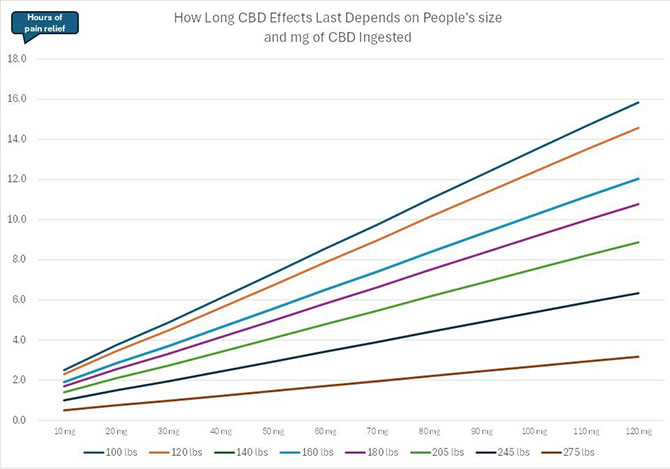Not Sure Where to Start?
Discover what works best for your body and lifestyle—whether you’re exploring for the first time or coming back for your favorites, we’ve got you covered.
The duration of CBD effects in your body depends on several factors, but the two most important ones are the dosage (mg of CBD taken) and the weight of the person using it. These are the primary factors for calculating the appropriate dosage.
However, other elements also play a role, including:
- The amount of CBD consumed (mg)
- The weight of the person taking it
- The condition being treated (e.g., chronic pain)
- The form of CBD (e.g., oil, capsule, etc.)
- Frequency of use
- The person’s metabolism
Different Forms of CBD
In the U.S., CBD is available in five main forms:
- Drops (oils and tinctures)
- Pills and capsules
- Edibles
- Vaping or smoking
- Creams and lotions
- Tea
Vaping or smoking CBD allows it to enter the system faster but also exit more quickly. Pills can take around 20 minutes to digest, while oils or tinctures applied directly under the tongue work almost as fast as smoking. For health reasons, however, all forms are preferable to smoking.
A strong, high-potency CBD lotion can sometimes provide faster pain relief for muscle, joint, or bone issues compared to other forms.
While tinctures taken under the tongue may have a bitter taste, this harsh flavor often signals immediate absorption—similar to inhaling from a vape pen. Edibles and tea take longer to kick in but also take longer to leave the system.
Finding Your Own Dosage
Most people approach CBD experimentally, and wisely so, since it was first used during a time when many doctors didn’t recognize its benefits. Once you find your optimal dosage for pain relief (ranging from 10 mg to 100 mg depending on factors listed above), you can predict how long the effects will last.
For example, someone with chronic pain may take 30 mg of CBD in the morning and apply 5 mg topically to areas in distress. This person may need to repeat the process two or three times a day to manage the pain. In contrast, a person dealing with temporary pain may need only one or two doses.
We typically recommend starting with one 30 mg gel cap (or the equivalent in oil or tincture) and waiting 15 to 20 minutes. If there’s no effect, a higher dose might be needed. If the CBD makes you sleepy when that wasn’t the intention, the dose is likely too high.
Not Sure Where to Start?
Discover what works best for your body and lifestyle—whether you’re exploring for the first time or coming back for your favorites, we’ve got you covered.
Duration of Effects
It would be ideal if we could say definitively, “If you take 15 mg, it will last 2 hours.” But the reality is, people and their pain levels vary greatly.
While no scientific chart exists that provides exact data on dosage versus duration, we’ve created a fictitious chart to show the general relationship between the two most influential factors: dosage and body weight. The numbers in the chart are for demonstration purposes only, to illustrate how weight and dosage affect how long CBD continues to provide anti-inflammatory and pain-relief effects.
At the far left, the top blue line is a small person. It shows that a low dose of CBD (10 mg) for a small person can give pain relief for two hours. That is a reasonable expectation, if we’re not dealing with chronic or severe pain. To the right, it shows that same person taking 120 mg would expect to get 12 to 14 hours of pain relief, and I would expect they would be sleeping through all that.
The bottom brown line is a 275-pound person. The far right of the chart shows that this person may need 120 mg of CBD to get 2 to 4 hours of pain relief. Again, the other primary factor, the severity of the pain or symptom being treated, is not shown. The graph is limited to mg of CBD and weight and demonstrates how they impact the duration of the pain relief realized.
Finding the Right Potency
The potency per serving of all our products can be found in this one chart, designed to help guide in choosing the form and dosage right for you.
Conclusion
There are so many factors involved in determining how long CBD effects last that it requires individual experimentation. It requires starting at a low dose and moving up until the precise dose is found. And something else that deters us from giving or getting definitive answers is the fact that the healing compounds for the endocannabinoid system are adaptogens. This means that they give different results to different people, depending on what the individual’s system needs. And that factor means that although science will teach us a lot about the hemp plant’s medicinal compounds in the coming decades, we may never unravel all its mysteries.
Not Sure Where to Start?
Discover what works best for your body and lifestyle—whether you’re exploring for the first time or coming back for your favorites, we’ve got you covered.










Comments are closed.